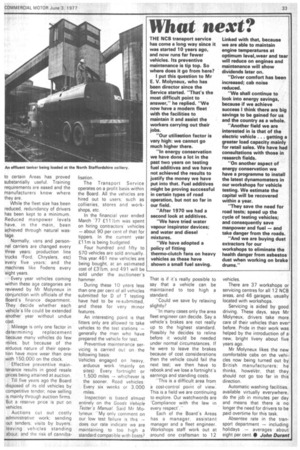What next?
Page 35

If you've noticed an error in this article please click here to report it so we can fix it.
THE NCB transport service has come a long way since it was started 10 years ago, and now runs far fewer vehicles. Its preventive maintenance is tip top. So where does it go from here?
I put this question to Mr E. V. Molyneux, who has been director since the Service started. "That's the most difficult point to . answer," he replied. "We now have a modern fleet with the facilities to maintain it and assist the workers carrying out their jobs.
"Our utilisation factor is very high: we cannot go much higher there.
"In energy conservation we have done a lot in the past two years on testing fuel additives and we have not achieved the results to justify the money we have put into that. Fuel additives might be proving successful in certain types of road operation, but not so far in our field.
"After 1970 we had a second look at additives.
"We have tried water vapour inspirator devices; and water and diesel mixtures.
"We have adopted a policy of fitting thermo-clutch fans on heavy vehicles as these have shown a small fuel saving. Linked with that, because we are able to maintain engine temperatures at optimum level, wear and tear will reduce on engines and maintenance will show dividends later on.
"Driver comfort has been increased; cab noise reduced.
"We shall continue to look into energy savings, because if we achieve success I think there are big savings to be gained for us and the country as a whole.
"Another field we are interested in is that of the electric vehicle. .. getting a greater load capacity mainly for retail sales. We have had consultations with those in research fields.
"On another aspect of energy conservation we have a programme to install the latest dynamometers in our workshops for vehicle testing. We estimate the capital will be recovered within a year.
"They save the need for road tests; speed up the cycle of testing vehicles; and consequently save manpower and fuel — and take danger from the roads.
"And we are buying dust extractors for our workshops to eliminate the health danger from asbestos dust when working on brake drums."




















































































































